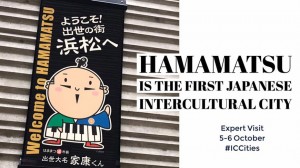
Originally posted at www.coe.int/en/web/interculturalcities
On 5-6 October an ICC team carried out an expert’s visit to the Japanese city of Hamamatsu, following its accession to the ICC programme.
The visit served to assess on-the-spot and review Hamamatsu Index results, propose recommendations, and get a clear understanding of the opportunities and challenges of integrating Japanese society and culture into the ICC programme. During the very well organised event, with a rich and detailed programme prepared by the city, the ICC team had the opportunity to visit the outstanding Hamamatsu Intercultural Centre, as well as several schools and education institutions (both public schools and informal education settings), and a business place. The team also had a public exchange of views with representatives of almost all city administration departments, as well as of the foreign resident community, of the civil society and of institutions entirely or partially funded by the city.
Hamamatsu rightly scored 20th among the 88 cities in the ICC sample, showing a deep understanding and valorisation of interculturalism as well as of inclusion policies. Among the strengths of the city:
- A strong political commitment towards inclusive intercultural integration;
- A cadre of well-trained and informed officials both in the municipality and NPOs, as well as a high level of cooperation and coordination both internally within the municipality and between different public and civil society agencies;
- A strong commitment to achieving equal opportunities through language, with important investments to provide free and unlimited language training to all foreigners.
Among the highlights of the visit there are two initiatives that can certainly be considered as examples of good practices in the field of diversity advantage, thanks to the cooperation between the municipality and the civil society on one hand, and the private sector on the other:
- the NPO Colours was set up by young people of foreign roots who decided to act as a role model for their fellows to inspire higher aspirations. They work by encouraging the sharing of roots and life stories, seeking each other’s assets and engaging discussions also in all-Japanese schools to encourage intermixing.
- Seibu Driving school is a private business that, in 2006, became an example of diversity advantage by training and recruiting Japanese-Brazilians driving instructors to provide driving lessons in Portuguese. The driving school has not only hired four Japanese Brazilians, but it has also paid for their own training to become driving instructors, translated all teaching materials into Portuguese, and negotiated with the Prefecture to have the driving test in Portuguese language recognized as officially valid for getting the driving license. The manuals are now also available in Spanish and English and the negotiations to have the tests in those languages are on-going. The launch of driving lessons and tests into Portuguese language have increased the number of Portuguese speaking foreigners getting an official driving license, thus reducing the number of accidents and risks, and increasing their job opportunities. As a side effect, Seibu school has also increased its income as it is the only school in Japan to provide this specific service.

